人教版新目标英语()七年级上册全册课文听力活动录音材料
- 格式:doc
- 大小:41.00 KB
- 文档页数:10
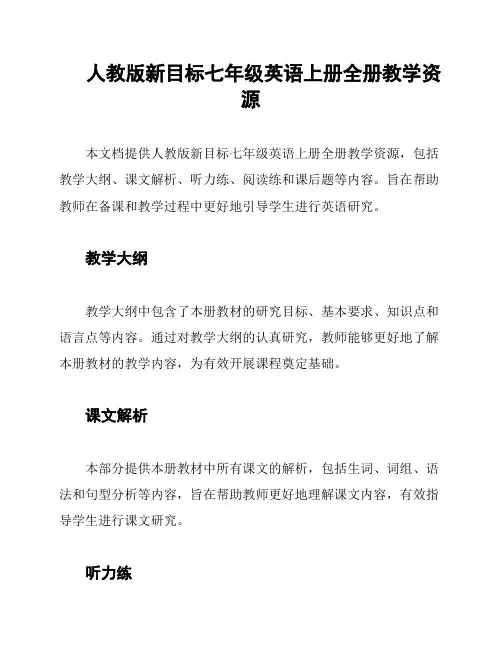
人教版新目标七年级英语上册全册教学资
源
本文档提供人教版新目标七年级英语上册全册教学资源,包括教学大纲、课文解析、听力练、阅读练和课后题等内容。
旨在帮助教师在备课和教学过程中更好地引导学生进行英语研究。
教学大纲
教学大纲中包含了本册教材的研究目标、基本要求、知识点和语言点等内容。
通过对教学大纲的认真研究,教师能够更好地了解本册教材的教学内容,为有效开展课程奠定基础。
课文解析
本部分提供本册教材中所有课文的解析,包括生词、词组、语法和句型分析等内容,旨在帮助教师更好地理解课文内容,有效指导学生进行课文研究。
听力练
听力练部分提供了本册教材中所有课文的听力练,旨在帮助学
生提高听力技能,加深对课文理解,同时也能为教师的听力教学提
供帮助。
阅读练
阅读练部分提供了本册教材中所有课文的阅读练,旨在帮助学
生提高阅读理解能力,增强对语言知识的掌握和应用。
课后题
本节提供了每个单元的课后题,旨在帮助学生检测对知识点的
掌握情况,同时也能够为教师提供重点难点的针对性指导,有效提
高学生英语研究效果。
以上是人教版新目标七年级英语上册全册教学资源的简要介绍,希望能够为广大英语教师提供帮助,促进学生的英语学习。
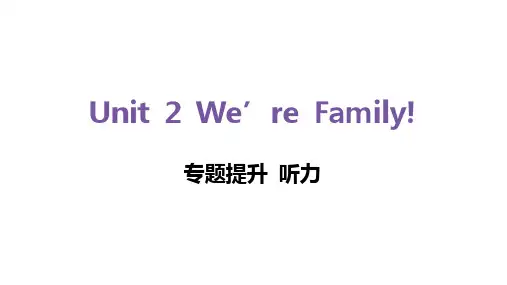
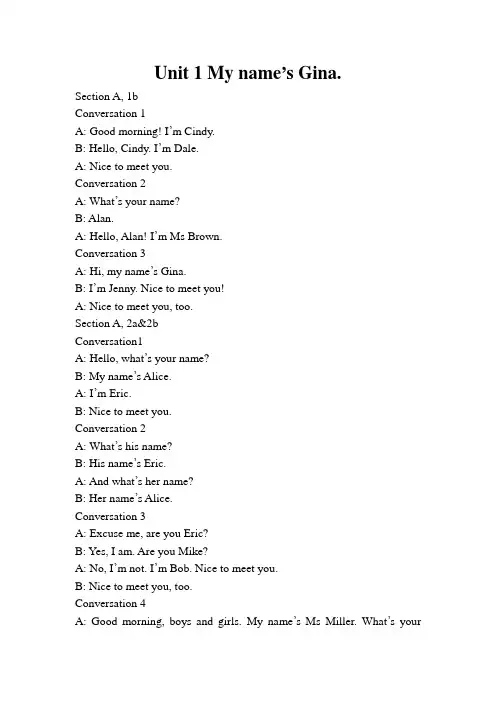
Unit 1 My name’s Gina.Section A, 1bConversation 1A: Good morning! I’m Cindy.B: Hello, Cindy. I’m Dale.A: Nice to meet you.Conversation 2A: What’s your name?B: Alan.A: Hello, Alan! I’m Ms Brown.Conversation 3A: Hi, my name’s Gina.B: I’m Jenny. Nice to meet you!A: Nice to meet you, too.Section A, 2a&2bConversation1A: Hello, what’s your name?B: My name’s Alice.A: I’m Eric.B: Nice to meet you.Conversation 2A: What’s his name?B: His name’s Eric.A: And what’s her name?B: Her name’s Alice.Conversation 3A: Excuse me, are you Eric?B: Yes, I am. Are you Mike?A: No, I’m not. I’m Bob. Nice to meet you.B: Nice to meet you, too.Conversation 4A: Good morning, boys and girls. My name’s Ms Miller. What’s yourname?B: My name’s Jack.A: And what’s your name?C: My name’s Mary.Section B, 1a数字0—9Section B, 1bA: What’s your telephone number, Alan? B: It’s 278-6926.A: 2-7-8-6-9-2-6. Thanks.Section B, 1d&1eConversation 1A: Hello. What’ s your name?B: My name’s Tom.A: What’s your telephone number?B: It’s 278-7928.Conversation 2A: Hi, Linda.B: Hello, Bill.A: Linda, what’s your phone number? B: Oh, it’s, umm…555-8024. Conversation 3A: Hi! I’m Ms Miller.B: Hello, Ms Miller! My name’s Bob. A: What’s your phone number, Bob? B: My phone number? It’s 398-6149. Conversation 4A: Hello, Mary!B: Oh, hi, Dale!A: Mary, what’s your phone number? B: It’s 929-3160.Unit 2 This is my sister.Section A 1b P7A: That’s my family. These are my parents.B: Who’s she?A: She’s my sister. Oh, and these are my brothers.B:Who are they?A: They’re my grandparents.2a&2b P8A: Cindy, is this your family photo?B: Yes, it is,Li Lan.A: Are these your parents?B: Yes, they are. This is my mother Jenny. And this is my father Tom. A: Oh, who’s she?B: She’s my sister Mary.A: Who’re they?B: They’re my grandparents, Linda and Bob.A: And who’s he?B: He’s my brother Jack.2d 见课本P8 对话Section B 1b&1c P10A: This is a photo of my family. This is my aunt.B: Who’s he?A: He’s my uncle.B: And is she your cousin?A: Yes, she’s my cousin, Jiang Shan. And these are her friends.B: Who are they?A: They’re my grandpa and grandma.2b 见课本P11 课文语音教学内容详见课本P72Unit3 Is this your pencil? 课本听力原文Section AP13 1bConversation 1A: Are these your books?B: No, they aren’t. They’re hers.Conversation 2A: Is that your schoolbag?B: No, it isn’t. It’s his.Conversation 3A: Is this your pencil?B: Yes, it is. It’s mine.P14 2a&2bTom: Excuse me, Grace. Is this your pencil?Grace: Yes, thank you. And those are my erasers.Tom: And Jane, is this your ruler?Jane: No, it isn’t. It’s hers.Tom: OK, and these are my books. This is your pencil box, Jane.P14 2d (详见课本)Section BP16 1c&1dConversation 1A: I lost my watch this morning.B: OK. Is this your watch?A: No, it isn’t. That’s my watch.B: Here you are.A: And that’s my ID card.B: OK. What’s your name?A: Linda.Conversation 2A: That’s my pen.B: This?A: Yes, and that’s my baseball.B: All right. What’s your name?A: Mike.B: OK. Here’s your baseball.A: Thank you.P17 2b (详见课本)Pronunciation P73Unit 4 Where’s my schoolbag?Section A 1bA: Where are my books?B: They’re on the sofa.A: How about my pencil box?C: It’s in your schoolbag.A: OK, and where’s my computer game?C: Your computer game? It’s under your bed.A: Great! Now where are my keys?B: Oh, they’re on the table.2a & 2bA: Hey, Helen!B: Yes?A: Is my computer game on the table?B: No, it isn’t. It’s in the bookcase.A: Oh, OK. How about my books? Are they in the bookcase, too?B: No, they aren’t. They’re on the chair.A: Oh, so, where’s my pencil box?B: Hmm, it’s under the sofa.A: And where’s my schoolbag?B: It’s under the table. And your ruler is under the chair.A: Oh, I see. And where are mom’s keys?B: The keys? They’re on the table.2d 见课本P20Section B1cA: Hello?B: Hi, mom. Could you bring some things to school for me?A: OK.B: I need my English books.A: English books? Where are your English books?B: Hmm, they’re on the chair. Oh, no, they’re under the radio.A: OK.B: And I need my ruler. It’s on the bed. And my notebook.A: Where’s your notebook?B: Err, I don’t know. Oh, it’s under the model plane in the bookcase. And Frank’s tape. He needs it.A: Where’s his tape?B: Oh, it’s in the tape player.A: OK. Meet you at one at your school.B: Thanks, mom.2b 见课本P23Pronunciation 见课本P74Unit 5 Do you have a soccer ball? Section A 1bA: Do you have a ping-pong bat?B: Yes, I do.A: Do you have a ping-pong ball?B: No, I don’t.2a &2bConversation 1A: Do you have a soccer ball, Paul?B: No, I don’t.A: Does your brother Alan one?B: Yes, he does.Conversation 2A: Hi, Mike!B: Hi, John.A: I want to play basketball. Do you have a basketball?B: Yes, I do.A: Great!Conversation 3A: Hi, Sally.B: Hi, Jane.A: Sally, this is my friend, Anna.B: Hi, Anna, nice to meet you.C: Nice to meet you, Sally.B: Let’s play tennis. Do you have a tennis ball, Jane?A: Sorry, I don’t.Conversation 4A: Do you have a volleyball, Dale?B: No, I don’t. But my brother does. Let’s go and find him.2d 见课本P26Section B 1bA: Hi, Paul! Let’s play computer game.B: That sounds interesting, Jenny. But I don’t have a computer.A: Well, do you have a volleyball?B: Yes.A: Then let’s play volleyball.B: Oh, volleyball is so difficult.A : OK, let’s watch TV.B: That sounds boring. Hmm, let’s play soccer. Do you have a soccer ball?A: No, I don’t.B: Oh, well, do you have a basketball?A: Yes, I do. Let’s play basketball.B: That sounds fun.2b 见课本P29PronunciationUnit 6 Do you like bananas?Section A 1bConversation 1A: Do you like bananas? B: Yes, I do.Conversation 2A: Do you like salad? B: No, I don’t.Conversation 3A: Do you like oranges? B: Yes, I do.2a&2bConversation 1A: I like hamburgers. Do you like hamburgers? B: Yes, I do.Conversation 2A: Do you like tamatoes? B: No, I don’t like tomatoes.Cnversation 3A: Let’s have ice cream. B: Oh, no.A: No? B: I don’t like ice cream.2d 见课本P32Section B1c& 1dA: Do you like carrots? B: Yes, I do. I like all vegetables.A: How about salad? Do you like salad? B: Yes, I do. It’s great. Do you like vegetables? A: No, I don’t like vegetables. Well, only salad. But I like fruit.I like bananas, oranges.B: How about apples? I don’t like apples.A: Yes, I like apples. And do you know what I really like?B: No. A: Ice cream!2b 见课本P35Pronunciation 见课本p74Unit 7 How much are these socks? Section A 1bA: How much is the hat?B: It’s six dollars.A: And how much are these shorts?B: Oh, they’re eight dollars.A: And this sweater? How much is it?B: Let’s see. It’s nine dollars.Section A 2aColors, black, white, red, green, blue, yellow, brown, purple, big, small, short, long Section A 2b&2cConversation 1A: I like big purple hats. Do you have one?B: Yes, I have this one here.A: How much is it?B: It’s five dollars.Conversation 2A: I like this brown sweater. How much is it?B: It’s eight dollars.Conversation 3A: How much are those red shorrts?B: They’re six dollars.Conversation 4A: How much is that green T-shirt?B: It’s seven dollars.Conversation 5A: I like those long blue and yellow socks. How much are they?B: They’re only two dollars.Conversation 6A: How much are the black trousers?B: They’re nine dollars.Section B 1a10,11,12,13,14,15,16,17,18,19,20,21,22,23,24,25,26,27,28,29,30,31Section B, 1c&1dA: Oh, look! I like that biue sweater. Hoe much is it?B: Fifteen dollars. Oh, I like these sock.s.A: Oh, no. I don’t like red.B: Do you like this T-shirt?A: Mmm, yes, I do, but it’s eleven dollars.B: Oh. How much is the green sweater?A: It’s twenty dollars. But you have a green sweater.B: Mmm.A: Oh, do you like these trousers?B: Oh, yes. How much are they?A: Only sixteen dollar.B: OK, I’ll take them.Unit 8 When is your birthday?Section A, 1bConversation 1A: When is your birthday, Linda?B: My birthday is on May 2nd.Conversation 2A: When is your birthday, Mary?B: It’s on January 5th.Conversation 3A: When is your birthday,Mike?B: My birthday is on June 3rd.Section A, 2a从第一到第三十一Section A, 2b&2cA: Now, Alice, how old are you?B: I’m thirteen.A: When is your birthday?B: It’s on Septenber 5th, Mr Smith.A: Oh, OK. And how about Frank?B: Frank isn’t here today, but his birthday is on July 4th.A: Thank you, Alice. And Eric?C: My birthday is on January 17th.A: On January 17th . OK, and Jane, when is her birthday?C: Her birthday is on August 22nd.Section B, 1b&1cA: Hey, Sally. Can I ask you some questions?B: Sure, John..A: When is your birthday party?B: My birthday party is on October 5th.A: OK, and when is the basketball game?B: The basketball game? Oh, it’s on October 2nd.A: Good. And, umm, how about the school trip?B: The school trip is on September 26th and 27th.A: And when is the English test?B: Oh, that’s on Friday, September 29th.A: OK. Thank you!Unit 9 My favorite subject is science.Section A, 1bA: Hi, Anna! How is your first day of school?B: Hey, Linda. It’s good. I’m happy to see all my friends. What about you?A: Me, too. And my clases are great.B: What’s your favorite subject?A: My favorite subject is science. What’s yours?B: Hmm, well, I like art and math. But my favorite subject is music.Section A, 2aA: What’s your favorite subject?B: My favorite subject is PE.A: Why do you like PE?B: Because it’s fun.Section A, 2bA: What’s your favorite subject?B: My favorite subject is PE.A: Why do you like PE?B: Because it’s fun. Hoe about you? What’s your favorite subject?A: Hmm.My favorite suject is music.B: Really? Why?A: Because it’s relaxing.B: What subject do you not like?A: I don’t like history because it’ s boring.B: Really? I don’t like beography because it’s really difficult.Section B, 1b&1cA: Hi, David. How are you? Are you OK?B: No, I’m not.A: What’s wrong?B: It’s Tuesday.A: So?B:I have two math classes on Tuesday.A: You don’t like math?B:No. It’s so difficult. My father says it’s interesting, but I don’t think so.A: So what’s your favorite subject?B:Chinse. It’s difficult but interesting.A: When is your Chinese class?B: It’s on Monday, Wedensday, Thursday and Friday. I have to go now! I have math, history abd science this morning.A: Ok, see you at music class.B: Bye!。
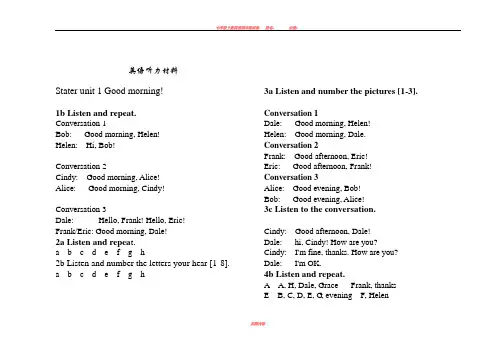
英语听力材料Stater unit 1 Good morning!1b Listen and repeat.Conversation 1Bob: Good morning, Helen!Helen: Hi, Bob!Conversation 2Cindy: Good morning, Alice!Alice: Good morning, Cindy!Conversation 3Dale: Hello, Frank! Hello, Eric!Frank/Eric: Good morning, Dale!2a Listen and repea t.a b c d e f g h2b Listen and number the letters your hear [1-8].a b c d e f g h 3a Listen and number the pictures [1-3]. Conversation 1Dale: Good morning, Helen!Helen: Good morning, Dale. Conversation 2Frank: Good afternoon, Eric!Eric: Good afternoon, Frank! Conversation 3Alice: Good evening, Bob!Bob: Good evening, Alice!3c Listen to the conversation.Cindy: Good afternoon, Dale!Dale: hi, Cindy! How are you?Cindy: I'm fine, thanks. How are you? Dale: I'm OK.4b Listen and repeat.A A, H, Dale, Grace Frank, thanksE B, C, D, E, G, evening F, HelenStater unit 2 What's this in English?1b Listen and repeat.Boy: What's this in English?Girl: It's an orange.Girl: What's that in English?Boy: It's a jacket.2a Listen and repeat.i j k l m n o p q r2b Listen and number the letters you hear [1-10].i j k l m n o p q r3a Listen and number the pictures [1-8].a key a map a pen a quilt a ruler an orange a jacket a cup 3b Listen and complete the words under the pictures in 3a.a key, K-E-Y, a keya map, M-A-P, a mapa pen, P-E-N, a pena quilt, Q-U-I-L-T, a quilta ruler, R-U-L-E-R, a ruleran orange, O-R-A-N-G-E, an orangea jacket, J-A-C-K-E-T, a jacketa cup, C-U-P, a cup3c Listen to the conversation. Then practice it with your partner.Boy: What's this in English? Girl: It's a map.Boy: Spell it, please.Girl: M-A-P.3d Listen to the conversations and number the words you hear Conversation 1Girl: What's this in English?Boy: It's a key.Girl: Spell it, please.Boy: K-E-Y.Conversation 2Boy: What's that?Girl: It's a cup.Boy: Spell it, please.Girl: C-U-P.Conversation 3Girl 1: What's that in English?Girl 2: It's a ruler.Girl 1: Spell it, please.Girl 2: R-U-L-E-R.Conversation 4Boy 1: What's this in English?Boy 2: It's a pen.Boy 1: Spell it, please.Boy 2: P-E-N.Stater unit 3 What color is it ? 1b Listen and repeat.Girl 1: What's this?Boy: It's V.Girl 1: What color is it?Boy: It's red.Girl 1: What's that?Girl 2: It's Z.Girl 1: What color is it?Girl 2: It's black.2a Listen and repeat.s t u v w x y z2b Listen and number the letters you hear [1-8]. s t u v w x y z3a Listen and color the things.Boy: What's this in English?Girl: It's a key.Boy: What color is it?Girl: It's yellow.Boy: What's that?Girl: It's a ruler.Boy: What color is it?Girl: It's blue.Boy: What's this? Girl: It's a cup.Boy: What color is it? Girl: It's red.3b Listen again.Complete the sentences. Boy: What's this in English? Girl: It's a key.Boy: What color is it? Girl: It's yellow.Boy: What's that?Girl: It's a ruler.Boy: What color is it? Girl: It's blue.Boy: What's this?Girl: It's a cup.Boy: What color is it? Girl: It's red.3c Listen and complete the chart.Bob: Good morning, Alice.Alice: Hi, Bob. How are you?Bob: I'm fine, thanks. What's this in English, Alice? Alice: It's a jacket.Bob: Spell it, please.Alice: J-A-C-K-E-T.Bob: What color is it?Alice: It's brown. What's that in English, Bob?Bob: It's a quilt.Alice: Spell it, please.Bob: Q-U-I-L-T.Alice: What color is it?Bob: It's purple. And what's this in English? Alice: It's a pen. P-E-N.Bob: What color is it?Alice: It's green. 4b Listen and sing the alphabet song.A, B, C, D, E, F, G,H, I, J, K, L, M, N,O, P, Q, R, S, T, U, V, W, X, Y, Z,X, Y, Z…now you see, I can say my ABCs.4c Listen and repeat.A A H J K Dale Grace,Frank thanks jacket map black EBCDE G P T V Z eveningF, L, M, N, S, X, (Z), Helen, pen, red, yellowI I, Y, hi, fine, white quilt, inO O, OK, no , orangeU Q, U, W, ruler, blue, cupUnit 1 My name's Gina.Section A1b Listen and number the conversations [1-3]. Conversation 1Cindy: Good morning. I'm Cindy!Dale: Hello, Cindy! I'm Dale.Cindy: Nice to meet you!Conversation 2Ms. Brown: What's your name?Alan: Alan.Ms. Brown: Hello, Alan. I'm Ms. Brown. Conversation 3Gina: Hi, my name's Gina.Jenny: I'm Jenny. Nice to meet you!Gina: Nice to meet you, too.2a Listen to the conversations and number the pictures [1-4]. Conversation 1Eric: Hello. What's your name?Alice: My name's Alice.Eric: I'm Eric.Alice: Nice to meet you!Conversation 2Tom: What's his name?Grace: His name 's Eric.Tom: And what's her name?Grace: Her name's Alice. Conversation 3Bob: Excuse me, are you Eric?Eric: Yes, I am. Are you Mike?Bob: No, I'm not. I'm Bob. Nice to meet you.Eric: Nice to meet you, too.Conversation 4Ms. Miller: Good morning, boys and girls. My name'sMs. Miller. What's your name?Jack: My name's Jack.Ms. Miller: And what's your name?Mary: My name's Mary.2b Listen again. Circle the names you hear.2d Role-play the conversation.Linda: Good afternoon! My name's Linda. Are you Helen?Helen: Yes, I am. Nice to meet you, Linda.Linda: Nice to meet you, too. What's her name? Helen: She's Jane.Linda: Is he Jack?Helen: No, he isn't. His name's Mike.Section B1b listen to the conversation and write the telephone number.Bill: What's your telephone number, Alan?Alan: It's 278-6926.Bill: 2-7-8-6-9-2-6. Thanks.1d Listen and match the names with the telephone numbers. Conversation 1Girl: Hello. What's your name?Tom: My name's Tom.Girl: What's your phone number, Tom?Tom: It's 278-7928.Conversation 2Bill: Hi, Linda!Linda: Hello, Bill!Bill: Linda, what's your phone number?Linda: Oh, it's, um… 555-8024.Conversation 3Ms. Miller: Hi! I'm Ms. Miller.]Bob: Hello, Ms. Miller! My name's Bob.Ms. Miller: What's your phone number, Bob? Bob: My phone number? It's 398-6149. Conversation 4Dale: Hello, Mary!Mary: Oh, hi, Dale!Dale: Mary, what's your phone number?Mary: It's 929-3160. 1a Listen and repeat.Zero one two three four five six seven eight nine2b Read the messages and match them with the pictures. Circle the first names and underline the last names.1. My name's Jenny Green. My phone number is281-9176. My friend is Gina Smith. Her phone number is 232-4672.2. I'm Dale Miller and my friend is Eric Brown. His telephone number is 357-5689. My telephone number is 358-6344.3. My name is Mary Brown. My friend is in China. Her name is Zhang Mingming. My phone number is 257-8900 and her number is 929-3155.Unit 2 This is my sister.Section A1b Listen and circle the words you hear in 1a.David: That's my family. Those are my parents.Lin Hai: Who's she?David: She's my sister. Oh, and these are my brothers. Lin Hai: Who're they?David: They're my grandparents.2a Listen and circle the words you hear.Li Lan: Cindy, is this your family photo?Cindy: Yes, it is, Li Lan.Li Lan: Are these your parents?Cindy: Yes, they are. This is my mother, Jenny, and this is my father, Tom.Li Lan: Oh, who's she?Cindy: She's my sister, Mary.Li Lan: Who're they?Cindy: They're my grandparents, Linda and Bob. Li Lan: And who's he?Cindy: He's my brother, Jack.2d Role-play the conversation.(课本)Section B1b Listen and check the words you hear.Jiang Tao: This is a photo of my family. This is my aunt. Tom: Who's he?Jiang Tao: He's my uncle.Tom: And is she your cousin?Jiang Tao: Yes, she's my cousin, Jiang Shan.And these are her friends.Tom: Who're they?Jiang Tao: They're my grandpa and grandma.1c Listen again. Which picture are Jiang Tao and Tom talking about?2b Read about Jenny's family and circle the names.My FamilyHi, I'm Jenny.Here are two nice photos of my family. My grandfather and grandmother are in the first photo. These are my parents, Alan and Mary. In the next picture are my brothers, Bob and Eric. These two girls are my sister Cindy and my cousin Helen. Coco is in my family, too.Unit 3 Is this your pencil?Section A1b Listen and number the conversations [1-3].Conversation 1Girl: Are these your books?Boy: No, they aren't. They're hers.Conversation 2Woman: Is that your schoolbag?Boy: No, it isn't. It's his.Conversation 3Boy: Is this your pencil?Girl: Yes, it is. It's mine.2a Listen and check the things you hear.Tom: Excuse me, Grace. Is this your pencil? Grace: Yes, thank you. And those are my erasers. Tom: And Jane, is this your ruler?Jane: No, it isn't. It's hers.Tom: Ok, and these are my books. This is your pencil box, Jane.2b Listen again. Complete the conversation with the words in the box.Section B1c Listen and circle the things you hear in 1a.Conversation 1Linda: I lost my watch this morning.Man: OK. Is this your watch?Linda: No, it isn't. That's my watch.Man: Here you are.Linda: And that's my ID card.Man: OK. What's your name?Linda: Linda.Conversation 2Mike: That's my pen.Man: This?Mike: Yes … and that's my baseball.Man: All right. What's your name?Mike: Mike.Man: OK. Here's your baseball.Mike: Thank you.2b Read the notices on the board and circle the lost things. (课本)Unit 4 Where's my schoolbag?Section A1b Listen and number the things in the picture [1-4].Tom: Where are my books?Father: They're on the sofa.Tom: How about my pencil box?Mother: It's in your schoolbag.Tom: Ok. And where's my computer game? Helen: Your computer game? It's under your bed. Tom: Great. Now where are my keys?Father: Oh, they're on the table.2a Listen and number the things [1-6] .Tom: Hey, Helen.Helen: Yes?Tom: Is my computer game on the table?Helen: No, it isn't. It's in the bookcase.Tom: Oh, Ok. How about my books? Are they on the bookcase, too?Helen: No, they aren't. They're on the chair.Tom: Oh. So, where's my pencil box?Helen: Hmm… it's under the sofa.Tom: And where's my schoolbag?Helen: It's under the table. And your ruler is under the chair.Tom: Oh, I see. And where are Mom's keys? Helen: The keys? They're on the table. Section B1c Listen and circle the things Tom wants from his room. Mom: Hello.Tom: Hi, Mom. Could you bring some things to school for me?Mom: OK.Tom: I need my English books…Mom: English books? Where are your English books? Tom: Hmm, they're on the chair .Oh, no, they're under the radio.Mom: OK.Tom: And I need my ruler. It's on the bed. And my notebook.Mom: Where's your notebook?]Tom: Uh, I don't know. Oh… it's under the model plane in the bookcase. And Frank's tape. He needs itMom: Where's his tape?Tom: Oh, it's in the tape player.Mom: OK. Meet you at one at your school.]Tom: Thanks, Mom!Unit 5 Do you have a soccer ball?Section A1b Listen and circle the words you hear.Boy 1: Do you have a ping-pong bat?Boy 2: Yes, I do.Boy 1: Do you have a ping-pong ball?Boy 2: No, I don't.2a Listen to the conversations and number the pictures [1-4]. Conversation 1Bob: Do you have a soccer ball, Paul?Paul: No, I don't.Bob: Does your brother Alan have one?Paul: Yes, he does.Conversation 2John: Hi, Mike.Mike: Hi, John.John: I want to play basketball. Do you have a basketball?Mike: Yes, I do.John: Great!Conversation 3Jane: Hi, Sally.Sally: Hi, Jane.]Jane: Sally, this is my friend, Anna.Sally: Hi, Anna. Nice to meet you.Anna: Nice to meet you, Sally. Sally: Let's play tennis. Do you have a tennis ball, Jane? Jane: Sorry, I don't.Conversation 4Frank: Do you have a volleyball, Dale?Dale: No, I don't. But my brother does. Let's go and find him.Section B1b Listen and check the description words you hear in 1a. Jenny: Hi, Paul! Let's play computer games!Paul: That sounds interesting. Jenny,but I don't have a computer.Jenny: Well, do you have a volleyball?Paul: Yes.Jenny: Then let's play volleyball.Paul: Oh, volleyball is so difficult ...Jenny: OK, let's watch TV.Paul: That sounds boring. Hmm ... Let's play soccer!Do you have a soccer ball?Jenny: No, I don't.Paul: Oh, well, do you have a basketball?Jenny: Yes, I do. Let's play basketball!Paul: That sounds fun!Unit 6 Do you like bananas?Section A1b Listen and number the conversations [1-3]. Conversation 1Boy: Do you like bananas?Girl: Yes, I do.Conversation 2Girl 1: Do you like salad?Girl 2: No, I don't.Conversation 3Girl: Do you like oranges?Boy: Yes, I do.2a Listen and circle the food you hear.Conversation 1Girl: I like hamburgers. Do you like hamburgers? Boy: Yes, I do.Conversation 2Girl: Do you like tomatoes?Boy: No, I don't like tomatoes.Conversation 3Girl: Let's have ice-cream.Boy: Oh, no.Girl: No?Boy: I don't like ice-cream.2b Listen again. Fill in the blanks. Section B1c Listen and circle the food you hear in 1a.Sally: Do you like carrots?Tom: Yes, I do. I like all vegetables.Sally: How about salad? Do you like salad?Tom: Yes, I do. It's great! Do you like vegetables? Sally: No, I don't like vegetables. Well, only salad. But I like fruit. I like bananas, oranges ...Tom: How about apples? I don't like apples.Sally: Yes, I like apples. And you know what I really like?Tom: What?Sally: Ice-cream.1d Listen again. Fill in the chart.Unit 7 How much are these socks? Section A1b Listen and circle the things you hear in the picture in 1a. Girl: How much is the hat?Woman: It's six dollars.Girl: And how much are these shorts?Woman: Oh, they're eight dollars.Girl: And this sweater? How much is it? Woman: Let's see. It's nine dollars.2b Listen to the conversations and circle the things you hear. Conversation 1Girl: I like big purple hat. Do you have one? Woman: Yes, I have this one here.Girl: How much is it?Woman: It's five dollars.Conversation 2Boy: I like this brown sweater. How much is it? Man: It's eight dollars.Conversation 3Girl: How much are these red shorts?Man: They're six dollars. Conversation 4Girl: How much is that green T-shirt?Woman: It's seven dollars.Conversation 5Boy: I like these long blue and yellow socks. How much are they?Man: They're only two dollars.Conversation 6Boy: How much are the black trousers?Woman: They're nine dollars.Section B1c Listen and circle the numbers you hear in 1a.Mom: Oh, look. I like that blue sweater. How much is it? Kate: Fifteen dollars. Oh, I like these socks.Mom: Oh, no. I don't like red.Kate: Do you like this T-shirt?Mom: Mmm, yes, I do, but it's eleven dollars.Kate: Oh. How much is the green sweater?Mom: It's twenty dollars. But you have a green sweater. Kate: Mmm.Mom: Oh, do you like these trousers?Kate: Oh, yes. How much are they?Mom: Only sixteen dollars.Kate: OK, I'll take them.Unit 8 When is your birthday?Section A1b Listen and number the conversations [1-3].Conversation 1Girl: When is your birthday,Linda?Linda: My birthday is on October 2nd.Conversation 2Boy: When is your birthday, Mary?Mary: It's on January 5th.Conversation 3Boy: When is your birthday, Mike?Mike: My birthday is on June 3rd.2b Listen and circle the numbers you hear in 2a.Mr. Smith: Now, Alice, how old are you?Alice: I'm thirteen.Mr. Smith: When is your birthday?Alice: It's on September 5th, Mr. Smith.Mr. Smith: Oh, OK. And how about Frank?Alice: Frank isn't here today, but his birthday in on July 4th.Mr. Smith: Thank you, Alice. And Eric?Eric: My birthday is on January 17th.Mr. Smith: On January 17th. OK. And Jane, when is her birthday?Eric: Her birthday is on August 22nd. Section B1b Listen and circle the events you hear in 1a.John: Hey, Sally. Can I ask you some questions? Sally: Sure, John.John: When is your birthday party?Sally: My birthday party is on October 5th.John: OK, and when is the basketball game? Sally: The basketball game? Oh, it's on October 2nd. John: Good. And, umm, how about the school trip? Sally: The school trip is on September 26th and 27th. John: And when is the English test?Sally: Oh, that's on Friday, September 29th.John: OK. Thank you!1c Listen again. Fill in John's calendar.Unit 9 My favorite subject is science.1b Listen and circle the subjects you hear in 1a.Linda: Hi, Anna! How's your first day of school? Anna: Hey, Linda! It's good. I'm happy to see all my friends. What about you?Linda: Me, too. And my classes are great.Anna: What's your favorite subject?Linda: My favorite subject is science. What's yours? Anna: Hmm. Well, I like art and math.But My favorite subject is music.2a Listen and put the conversation in order.Boy 1: What's your favorite subject?Boy 2: My favorite subject is P.E.Boy 1: Why do you like P.E.?Boy 2: Because it's fun.2bListen and match the subjects you hear with the descriptions. Boy 1: What's your favorite subject?Boy 2: My favorite subject is P.E.Boy 1: Why do you like P.E.?Boy 2: Because it's fun. How about you?What's your favorite subject?Boy 1: Hmm. My favorite subject is music. Boy 2: Really? Why?Boy 1: Because it's relaxing.Boy 2: What subject do you not like?Boy 1: I don't like history because it's boring.Boy 2: Really? I don't like geography because it's really difficult.1b Listen and check the words your hear in 1a.Eric: Hi, David. How are you? Are you OK? David: No, I'm not.Eric: What's wrong?David: It's Tuesday.Eric: So?David: I have two math classes on Tuesday.Eric: You don't like math?David: No. It's so difficult! My father says it's interesting. But I don't think so.Eric: So what's your favorite subject?David: Chinese. It's difficult but interesting!Eric: When is your Chinese class?David: It's on Monday, Wednesday, Thursday and Friday.I have to go now! I have math, history and sciencethis morning.Eric: OK, see you at music class.David: Bye!。
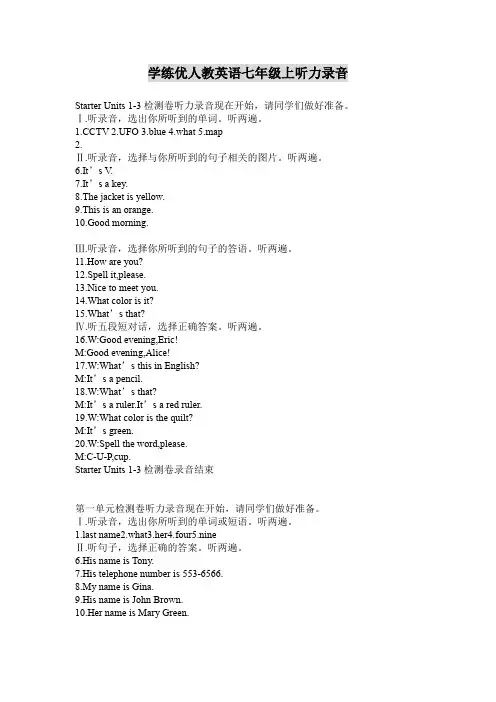
学练优人教英语七年级上听力录音Starter Units 1-3检测卷听力录音现在开始,请同学们做好准备。
Ⅰ.听录音,选出你所听到的单词。
听两遍。
TV2.UFO3.blue4.what5.map2.Ⅱ.听录音,选择与你所听到的句子相关的图片。
听两遍。
6.It’s V.7.It’s a key.8.The jacket is yellow.9.This is an orange.10.Good morning.Ⅲ.听录音,选择你所听到的句子的答语。
听两遍。
11.How are you?12.Spell it,please.13.Nice to meet you.14.What color is it?15.What’s that?Ⅳ.听五段短对话,选择正确答案。
听两遍。
16.W:Good evening,Eric!M:Good evening,Alice!17.W:What’s this in English?M:It’s a pencil.18.W:What’s that?M:It’s a ruler.It’s a red ruler.19.W:What color is the quilt?M:It’s green.20.W:Spell the word,please.M:C-U-P,cup.Starter Units 1-3检测卷录音结束第一单元检测卷听力录音现在开始,请同学们做好准备。
Ⅰ.听录音,选出你所听到的单词或短语。
听两遍。
st name2.what3.her4.four5.nineⅡ.听句子,选择正确的答案。
听两遍。
6.His name is Tony.7.His telephone number is 553-6566.8.My name is Gina.9.His name is John Brown.10.Her name is Mary Green.Ⅲ.听句子,选择相应的答语。
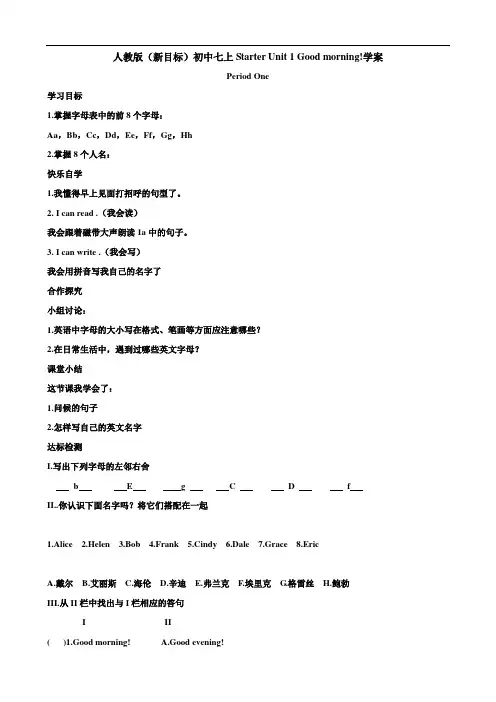
人教版(新目标)初中七上Starter Unit 1 Good morning!学案Period One学习目标1.掌握字母表中的前8个字母:Aa,Bb,Cc,Dd,Ee,Ff,Gg,Hh2.掌握8个人名:快乐自学1.我懂得早上见面打招呼的句型了。
2. I can read .(我会读)我会跟着磁带大声朗读1a中的句子。
3. I can write .(我会写)我会用拼音写我自己的名字了合作探究小组讨论:1.英语中字母的大小写在格式、笔画等方面应注意哪些?2.在日常生活中,遇到过哪些英文字母?课堂小结这节课我学会了:1.问候的句子2.怎样写自己的英文名字达标检测I.写出下列字母的左邻右舍b E g C D fII..你认识下面名字吗?将它们搭配在一起1.Alice2.Helen3.Bob4.Frank5.Cindy6.Dale7.Grace8.EricA.戴尔B.艾丽斯C.海伦D.辛迪E.弗兰克F.埃里克G.格雷丝H.鲍勃III.从II栏中找出与I栏相应的答句I II( )1.Good morning! A.Good evening!( )2.Hi, Ann! B.Good morning!( )3.Good afternoon! C.Hi, Tom!( )4.Good evening! D.Good afternoon!IV.补全对话1.-________________, Helen!-Good morning, Cindy!2.-Hi, Bob.-________________, Alice.3.-Good evening!-_______________!V.单项选择( )1.早上或上午见面说:“_______”A.Good morning!B.Good afternoon!C.Good evening! ( )2.熟人之间打招呼时应说:“_______”A.Hi!B.Good morning!C.Good afternoon!( )3.傍晚遇见你的好朋友说:“_______”A.Good morning!B.Hi!C.Good evening!( )4.当别人对你说Hello, Frank!你应说:“_______”A.Hello, Eric!B.Good morning, Eric!C.Good evening, Eric! 学习反思答案:I.a b c D E F f g h B C D C D E e f g II.1-8. BCHEDAGFIII.1-4.BCDAIV.1. Good morning2.Hello/Hi3. Good eveningV.1-4.AACA人教版(新目标)初中七上Starter Unit 1 Good morning!学案Period Two学习目标1.掌握字母表中的前8个字母:Aa ,Bb ,Cc ,Dd ,Ee ,Ff ,Gg ,Hh2.掌握3个新单词:HB ,CD ,BBC快乐自学1. I can listen .(我会听)我会听录音并跟读2a2. I can finish .(我会完成)我能根据2b 听录音,根据所听到的顺序为字母编号。
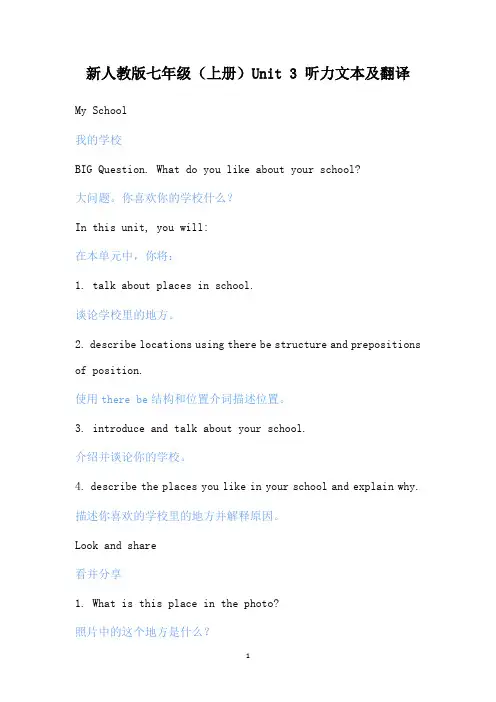
新人教版七年级(上册)Unit 3 听力文本及翻译My School我的学校BIG Question. What do you like about your school?大问题。
你喜欢你的学校什么?In this unit, you will:在本单元中,你将:1. talk about places in school.谈论学校里的地方。
2. describe locations using there be structure and prepositions of position.使用there be结构和位置介词描述位置。
3. introduce and talk about your school.介绍并谈论你的学校。
4. describe the places you like in your school and explain why. 描述你喜欢的学校里的地方并解释原因。
Look and share看并分享1. What is this place in the photo?照片中的这个地方是什么?2. What are the people doing on the sports field?人们在运动场上做什么?3. What do you like to do at school?你在学校喜欢做什么?SECTION AA节What is your school like?你的学校怎么样?1a. Look at the picture. Talk about the positions of the places with the words in the box.1a. 看图。
用框中的词语谈论各个地方的位置。
Where’s the dining hall?餐厅在哪里?It’s in front of the art building.在艺术楼的前面。
in front of. behind. next to. between. across from在...前面。
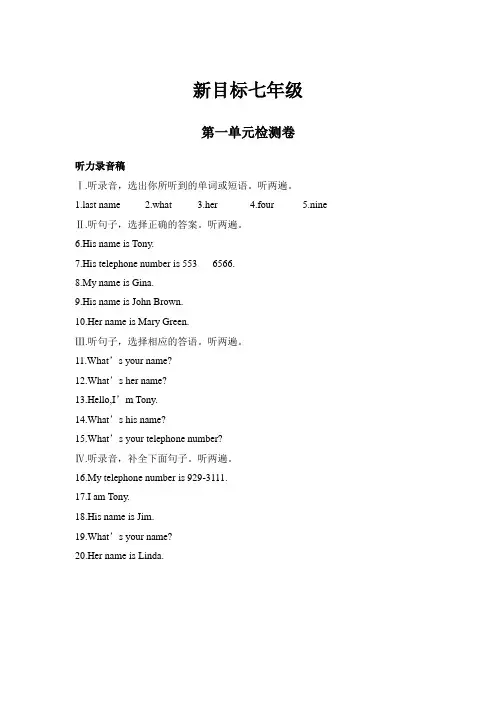
新目标七年级第一单元检测卷听力录音稿Ⅰ.听录音,选出你所听到的单词或短语。
听两遍。
st name2.what3.her4.four5.nine Ⅱ.听句子,选择正确的答案。
听两遍。
6.His name is Tony.7.His telephone number is 5536566.8.My name is Gina.9.His name is John Brown.10.Her name is Mary Green.Ⅲ.听句子,选择相应的答语。
听两遍。
11.What’s your name?12.What’s her name?13.Hello,I’m Tony.14.What’s his name?15.What’s your telephone number?Ⅳ.听录音,补全下面句子。
听两遍。
16.My telephone number is 929-3111.17.I am Tony.18.His name is Jim.19.What’s your name?20.Her name is Linda.听力录音稿Ⅰ.听录音,选出你所听到的单词或词组。
听两遍。
1.mother2.grandfather3.his parents4.thanks5.auntⅡ.听句子,选出相应的答语。
听两遍。
6.Who’s he?7.Is she your aunt?8.Is Guo Lin your brother?9.Are those your parents?10.Is that your father?Ⅲ.听对话,选出符合对话内容的图片。
听两遍。
11.M:Who’s she?W:She’s my mother.12.M:Nice to meet you.W:Nice to meet you,too.13.M:Who’re they?W:They’re my grandparents.14.M:Good morning,Alice.W:Good morning,Bob.15.W:What’s this in English?M:It’s a ruler.Ⅳ.听对话,选择正确的答案。
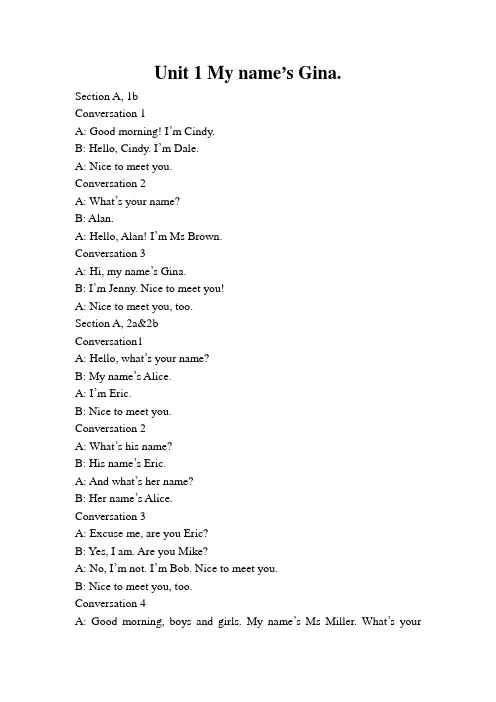
Unit 1 My name’s Gina.Section A, 1bConversation 1A: Good morning! I’m Cindy.B: Hello, Cindy. I’m Dale.A: Nice to meet you.Conversation 2A: What’s your name?B: Alan.A: Hello, Alan! I’m Ms Brown.Conversation 3A: Hi, my name’s Gina.B: I’m Jenny. Nice to meet you!A: Nice to meet you, too.Section A, 2a&2bConversation1A: Hello, what’s your name?B: My name’s Alice.A: I’m Eric.B: Nice to meet you.Conversation 2A: What’s his name?B: His name’s Eric.A: And what’s her name?B: Her name’s Alice.Conversation 3A: Excuse me, are you Eric?B: Yes, I am. Are you Mike?A: No, I’m not. I’m Bob. Nice to meet you.B: Nice to meet you, too.Conversation 4A: Good morning, boys and girls. My name’s Ms Miller. What’s yourname?B: My name’s Jack.A: And what’s your name?C: My name’s Mary.Section B, 1a数字0—9Section B, 1bA: What’s your telephone number, Alan? B: It’s 278-6926.A: 2-7-8-6-9-2-6. Thanks.Section B, 1d&1eConversation 1A: Hello. What’ s your name?B: My name’s Tom.A: What’s your telephone number?B: It’s 278-7928.Conversation 2A: Hi, Linda.B: Hello, Bill.A: Linda, what’s your phone number? B: Oh, it’s, umm…555-8024. Conversation 3A: Hi! I’m Ms Miller.B: Hello, Ms Miller! My name’s Bob. A: What’s your phone number, Bob? B: My phone number? It’s 398-6149. Conversation 4A: Hello, Mary!B: Oh, hi, Dale!A: Mary, what’s your phone number? B: It’s 929-3160.Unit 2 This is my sister.Section A 1b P7A: That’s my family. These are my parents.B: Who’s she?A: She’s my sister. Oh, and these are my brothers.B:Who are they?A: They’re my grandparents.2a&2b P8A: Cindy, is this your family photo?B: Yes, it is,Li Lan.A: Are these your parents?B: Yes, they are. This is my mother Jenny. And this is my father Tom. A: Oh, who’s she?B: She’s my sister Mary.A: Who’re they?B: They’re my grandparents, Linda and Bob.A: And who’s he?B: He’s my brother Jack.2d 见课本P8 对话Section B 1b&1c P10A: This is a photo of my family. This is my aunt.B: Who’s he?A: He’s my uncle.B: And is she your cousin?A: Yes, she’s my cousin, Jiang Shan. And these are her friends.B: Who are they?A: They’re my grandpa and grandma.2b 见课本P11 课文语音教学内容详见课本P72Unit3 Is this your pencil? 课本听力原文Section AP13 1bConversation 1A: Are these your books?B: No, they aren’t. They’re hers.Conversation 2A: Is that your schoolbag?B: No, it isn’t. It’s his.Conversation 3A: Is this your pencil?B: Y es, it is. It’s mine.P14 2a&2bTom: Excuse me, Grace. Is this your pencil?Grace: Y es, thank you. And those are my erasers.Tom: And Jane, is this your ruler?Jane: No, it isn’t. It’s hers.Tom: OK, and these are my books. This is your pencil box, Jane.P14 2d (详见课本)Section BP16 1c&1dConversation 1A: I lost my watch this morning.B: OK. Is this your watch?A: No, it isn’t. That’s my watch.B: Here you are.A: And that’s my ID card.B: OK. What’s your name?A: Linda.Conversation 2A: That’s my pen.B: This?A: Y es, and that’s my baseball.B: All right. What’s your name?A: Mike.B: OK. Here’s your baseball.A: Thank you.P17 2b (详见课本)Pronunciation P73Unit 4 Where’s my schoolbag?Section A 1bA: Where are my books?B: They’re on the sofa.A: How about my pencil box?C: It’s in your schoolbag.A: OK, and where’s my computer game?C: Y our computer game? It’s under your bed.A: Great! Now where are my keys?B: Oh, they’re on the table.2a & 2bA: Hey, Helen!B: Y es?A: Is my computer game on the table?B: No, it isn’t. It’s in the bookcase.A: Oh, OK. How about my books? Are they in the bookcase, too?B: No, they aren’t. They’re on the chair.A: Oh, so, where’s my pencil box?B: Hmm, it’s under the sofa.A: And where’s my schoolbag?B: It’s under the table. And your ruler is under the chair.A: Oh, I see. And where are mom’s keys?B: The keys? They’re on the table.2d 见课本P20Section B1cA: Hello?B: Hi, mom. Could you bring some things to school for me?A: OK.B: I need my English books.A: English books? Where are your English books?B: Hmm, they’re on the chair. Oh, no, they’re under the radio.A: OK.B: And I need my ruler. It’s on the bed. And my notebook.A: Where’s your notebook?B: Err, I don’t know. Oh, it’s under the model plane in the bookcase. And Frank’s tape. He needs it.A: Where’s his tape?B: Oh, it’s in the tape player.A: OK. Meet you at one at your school.B: Thanks, mom.2b 见课本P23Pronunciation 见课本P74Unit 5 Do you have a soccer ball? Section A 1bA: Do you have a ping-pong bat?B: Y es, I do.A: Do you have a ping-pong ball?B: No, I don’t.2a &2bConversation 1A: Do you have a soccer ball, Paul?B: No, I don’t.A: Does your brother Alan one?B: Y es, he does.Conversation 2A: Hi, Mike!B: Hi, John.A: I want to play basketball. Do you have a basketball?B: Y es, I do.A: Great!Conversation 3A: Hi, Sally.B: Hi, Jane.A: Sally, this is my friend, Anna.B: Hi, Anna, nice to meet you.C: Nice to meet you, Sally.B: Let’s play tennis. Do you have a tennis ball, Jane?A: Sorry, I don’t.Conversation 4A: Do you have a volleyball, Dale?B: No, I don’t. But my brother does. Let’s go and find him.2d 见课本P26Section B 1bA: Hi, Paul! Let’s play computer game.B: That sounds interesting, Jenny. But I don’t have a computer.A: Well, do you have a volleyball?B: Y es.A: Then let’s play volleyball.B: Oh, volleyball is so difficult.A : OK, let’s watch TV.B: That sounds boring. Hmm, let’s play soccer. Do you have a soccer ball?A: No, I don’t.B: Oh, well, do you have a basketball?A: Y es, I do. Let’s play basketball.B: That sounds fun.2b 见课本P29PronunciationUnit 6 Do you like bananas?Section A 1bConversation 1A: Do you like bananas? B: Yes, I do.Conversation 2A: Do you like salad? B: No, I don’t.Conversation 3A: Do you like oranges? B: Y es, I do.2a&2bConversation 1A: I like hamburgers. Do you like hamburgers? B: Y es, I do.Conversation 2A: Do you like tamatoes? B: No, I don’t like tomatoes.Cnversation 3A: Let’s have ice cream. B: Oh, no.A: No? B: I don’t like ice cream.2d 见课本P32Section B1c& 1dA: Do you like carrots? B: Yes, I do. I like all vegetables.A: How about salad? Do you like salad? B: Y es, I do. It’s great. Do you like vegetables? A: No, I don’t like vegetables. Well, only salad. But I like fruit.I like bananas, oranges.B: How about apples? I don’t like apples.A: Y es, I like apples. And do you know what I really like?B: No. A: Ice cream!2b 见课本P35Pronunciation 见课本p74Unit 7 How much are these socks? Section A1bA: How much is the hat?B: It’s six dollars.A: And how much are these shorts?B: Oh, they’re eight dollars.A: And this sweater? How much is it?B: Let’s see. It’s nine dollars.Section A 2aColors, black, white, red, green, blue, yellow, brown, purple, big, small, short, long Section A2b&2cConversation 1A: I like big purple hats. Do you have one?B: Y es, I have this one here.A: How much is it?B: It’s five dollars.Conversation 2A: I like this brown sweater. How much is it?B: It’s eight dollars.Conversation 3A: How much are those red shorrts?B: They’re six dollars.Conversation 4A: How much is that green T-shirt?B: It’s seven dollars.Conversation 5A: I like those long blue and yellow socks. How much are they?B: They’re only two dollars.Conversation 6A: How much are the black trousers?B: They’re nine dollars.Section B 1a10,11,12,13,14,15,16,17,18,19,20,21,22,23,24,25,26,27,28,29,30,31Section B, 1c&1dA: Oh, look! I like that biue sweater. Hoe much is it?B: Fifteen dollars. Oh, I like these sock.s.A: Oh, no. I don’t like red.B: Do you like this T-shirt?A: Mmm, yes, I do, but it’s eleven dollars.B: Oh. How much is the green sweater?A: It’s twenty dollars. But you have a green sweater.B: Mmm.A: Oh, do you like these trousers?B: Oh, yes. How much are they?A: Only sixteen dollar.B: OK, I’ll take them.Unit 8 When is your birthday?Section A, 1bConversation 1A: When is your birthday, Linda?B: My birthday is on May 2nd.Conversation 2A: When is your birthday, Mary?B: It’s on January 5th.Conversation 3A: When is your birthday,Mike?B: My birthday is on June 3rd.Section A, 2a从第一到第三十一Section A, 2b&2cA: Now, Alice, how old are you?B: I’m thirteen.A: When is your birthday?B: It’s on Septenber 5th, Mr Smith.A: Oh, OK. And how about Frank?B: Frank isn’t here today, but his birthday is on July 4th.A: Thank you, Alice. And Eric?C: My birthday is on January 17th.A: On January 17th . OK, and Jane, when is her birthday?C: Her birthday is on August 22nd.Section B, 1b&1cA: Hey, Sally. Can I ask you some questions?B: Sure, John..A: When is your birthday party?B: My birthday party is on October 5th.A: OK, and when is the basketball game?B: The basketball game? Oh, it’s on October 2nd.A: Good. And, umm, how about the school trip?B: The school trip is on September 26th and 27th.A: And when is the English test?B: Oh, that’s on Friday, September 29th.A: OK. Thank you!Unit 9 My favorite subject is science.Section A, 1bA: Hi, Anna! How is your first day of school?B: Hey, Linda. It’s good. I’m happy to see all my friends. What about you?A: Me, too. And my clases are great.B: What’s your favorite subject?A: My favorite subject is science. What’s yours?B: Hmm, well, I like art and math. But my favorite subject is music.Section A, 2aA: What’s your favorite subject?B: My favorite subject is PE.A: Why do you like PE?B: Because it’s fun.Section A, 2bA: What’s your favorite subject?B: My favorite subject is PE.A: Why do you like PE?B: Because it’s fun. Hoe about you? What’s your favorite subject?A: Hmm.My favorite suject is music.B: Really? Why?A: Because it’s relaxing.B: What subject do you not like?A: I don’t like history because it’ s boring.B: Really? I don’t like beography because it’s really difficult.Section B, 1b&1cA: Hi, David. How are you? Are you OK?B: No, I’m not.A: What’s wrong?B: It’s Tuesday.A: So?B: I have two math classes on Tuesday.A: Y ou don’t like math?B: No. It’s so difficult. My father says it’s interesting, but I don’t think so.A: So what’s your favorite subject?B: Chinse. It’s difficult but interesting.A: When is your Chinese class?B: It’s on Monday, Wedensday, Thursday and Friday. I have to go now! I have math, history abd science this morning.A: Ok, see you at music class.B: Bye!。
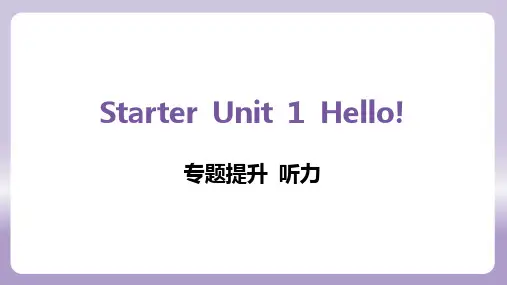
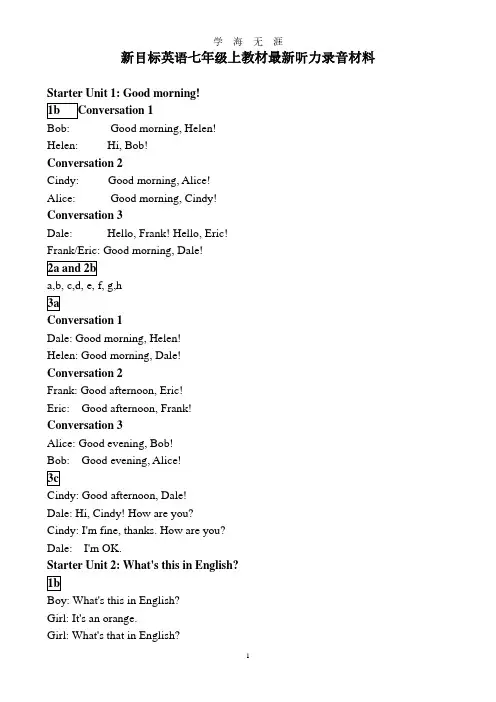
新目标英语七年级上教材最新听力录音材料Starter Unit 1: Good morning!Bob: Good morning, Helen!Helen: Hi, Bob!Conversation 2Cindy: Good morning, Alice!Alice: Good morning, Cindy!Conversation 3Dale: Hello, Frank! Hello, Eric!Frank/Eric: Good morning, Dale!a,b, c,d, e, f, g,hConversation 1Dale: Good morning, Helen!Helen: Good morning, Dale!Conversation 2Frank: Good afternoon, Eric!Eric: Good afternoon, Frank!Conversation 3Alice: Good evening, Bob!Bob: Good evening, Alice!Cindy: Good afternoon, Dale!Dale: Hi, Cindy! How are you?Cindy: I'm fine, thanks. How are you?Dale: I'm OK.Starter Unit 2: What's this in English?Boy: What's this in English?Girl: It's an orange.Girl: What's that in English?Boy: It's a jacket.i,j,k, 1, m, n, o,p, q,ra key a map a pen a quilt a ruler an orange a jacket a cupa key, K-E-Y, a keya map, M-A-P, a mapa pen, P-E-N, a pena quilt, Q-U-I-L-T, a quilta ruler, R-U-L-E-R, a ruleran orange, O-R-A-N-G-E, an orangea jacket, J-A-C-K-E-T, a jacketa cup, C-U-P, a cupBoy: What's this in English?Girl: It's a map.Boy: Spell it, please.Girl: M-A-P.Conversation 1Girl: What's this in English?Boy: It's a key.Girl: Spell it, please.Boy: K-E-Y.Conversation 2Boy: What's that?Girl: It's a cup.Boy: Spell it, please.Girl: C-U-P.Conversation 3Girl 1: What's that in English?Girl 2: It's a ruler.Girl 1: Spell it, please.Girl 2: R-U-L-E-R. Conversation 4Boy 1: What's this in English? Boy 2: It's a pen.Boy 1: Spell it, please.Boy 2: P-E-N.Starter Unit 3' What color is it?Girl 1: What's this?Boy: It's V.Girl 1: What color is it?Boy: It's red.Girl 1: What's that?Girl 2: It's Z.Girl 1: What color is it?Girl 2: It's black.s, t, u, v, w, x, y, zBoy: What's this in English? Girl: It's a key.Boy: What color is it?Girl: It's yellow.Boy: What's that?Girl: It's a ruler.Boy: What color is it?Girl: It's blue.Boy: What's this?Girl: It's a cup.Boy: What color is it?Girl: It's red.Bob: Good morning, Alice!Alice: Hi, Bob. How are you?Bob: I'm fine, thanks. What's this in English, Alice?Alice: It's a jacket.Bob: Spell it, please.Alice: J-A-C-K-E-T.Bob: What color is it?Alice: It's brown. What's that in English, Bob? Bob: It's a quilt.Alice: Spell it, please.Bob- Q-U-I-L-T.Alice: What color is it?Bob: It's purple. And what's this in English? Alice: It's a pen, P-E-N.Bob: What color is it?Alice: It's green.Unit 1: My name's Gina.Conversation 1Cindy: Good morning! I'm Cindy.Dale: Hello, Cindy! I'm Dale.Cindy: Nice to meet you!Conversation 2Ms. Brown: What's your name?Alan: Alan.Ms. Brown: Hello, Alan. I'm Ms. Brown. Conversation 3Gina: Hi. My name's Gina.Jenny: I'm Jenny. Nice to meet you!Gina: Nice to meet you, too.Conversation 1Eric: Hello. What's your name?Alice: My name's Alice.Eric: I'm Eric.Alice: Nice to meet you.Conversation 2Tom: What's his name?Grace: His name's Eric.Tom: And what's her name?Grace: Her name's Alice.Conversation 3Bob: Excuse me, are you Eric?Eric: Yes, I am. Are you Mike?Bob: No, I'm not. I'm Bob. Nice to meet you. Eric: Nice to meet you, too. Conversation 4Ms. Miller: Good morning, boys and girls. My name's Ms. Miller. What's your name?Jack: My name's Jack.Ms. Miller: And what's your name?Mary: My name's Mary.zero, one, two, three, four, five, six, seven, eight, nineBill: What's your telephone number, Alan? Alan: It's 278-6926.Bill: 2-7-8-6-9-2-6. Thanks.Conversation 1Girl: Hello. What's your name?Tom: My name's Tom.Girl: What's your phone number, Tom?Tom: It's 278-7928.Conversation 2Bill: Hi, Linda!Linda: Hello, Bill!Bill: Linda, what's your phone number?Linda: Oh, it's, umm ... 555-8024.Conversation 3Ms. Miller: Hi! I'm Ms. Miller.Bob: Hello, Ms. Miller! My name's Bob.Ms. Miller: What's your phone number, Bob?Bob: My phone number? It's 398-6149. Conversation 4Dale: Hello, Mary!Mary: Oh, hi, Dale!Dale: Mary, what's your phone number?Mary: It's 929-3160.Unit 2: This is my sister.David: That's my family. Those are my parents.Lin Hai: Who's she?David: She's my sister. Oh, and these are my brothers. Lin Hai: Who're they?David: They're my grandparents.Li Lan: Cindy, is this your family photo?Cindy: Yes, it is, Li Lan.Li Lan: Are these your parents?Cindy: Yes, they are. This is my mother,Jenny, and this is my father, Tom.Li Lan: Oh, who's she?Cindy: She's my sister, Mary.Li Lan: Who're they?Cindy: They're my grandparents, Linda and Bob.Li Lan: And who's he?Cindy: He's my brother, Jack.Jiang Tao: This is a photo of my family. Thisis my aunt.Tom: Who's he?Jiang Tao: He's my uncle.Tom: And is she your cousin?Jiang Tao: Yes, she's my cousin, Jiang Shan. And these are her friends.Tom: Who're they?Jiang Tao: They're my grandpa and grandma. Unit 3: Is this your pencil?Conversation 1Girl: Are these your books?Boy: No, they aren't. They're hers. Conversation 2Woman: Is that your schoolbag?Boy: No, it isn't. It's his.Conversation 3Boy: Is this your pencil?Girl: Yes, it is. It's mine.Tom: Excuse me, Grace. Is this your pencil? Grace: Yes, thank you. And those are my erasers. Tom: And Jane, is this your ruler?Jane: No, it isn't. It's hers.Tom: OK, and these are my books. This is your pencil box, Jane.Conversation 1Linda: I lost my watch this morning.Man: OK. Is this your watch?Linda: No, it isn't. That's my watch.Man: Here you are.Linda: And that's my ID card.Man: OK. What's your name?Linda: Linda.Conversation 2Mike: That's my pen.Man: This?Mike: Yes ... and that's my baseball.Man: All right. What's your name?Mike: Mike.Man: OK. Here's your baseball.Mike: Thank you.Unit 4: Where's my schoolbag?Torn: Where are my books?Father: They're on the sofa.Torn: How about my pencil box?Mother: It's in your schoolbag.Torn: OK. And where's my computer game? Helen: Your computer game? It's under your bed. Torn: Great. Now where are my keys? Father: Oh, they're on the table.Torn: Hey, Helen.Helen: Yes?Torn: Is my computer game on the table? Helen: No, it isn't. It's in the bookcase.Torn: Oh, OK. How about my books? Arethey in the bookcase, too?Helen: No, they aren't. They're on the chair. Torn: Oh. So, where's my pencil box?Helen: Hmm ... it's under the sofa.Torn: And where's my schoolbag?Helen: It's under the table. And your ruler is under the chair.Tom: Oh, I see. And where are Mom's keys? Helen: The keys? They're on the table.Mom: Hello.Tom: Hi, Mom. Could you bring some thingsto school for me?Mom: OK.Tom: I need my English books ...Mom: English books? Where are your English books? Tom: Hmm, they're on the chair ... Oh, no,they're under the radio.Mom: OK.Torn: And I need my ruler. It's on the bed.And my notebook.Mom: Where's your notebook?Tom: Uh, I don't know. Oh ... it's under themodel plane in the bookcase. AndFrank's tape. He needs it.Morn: Where's his tape?Tom: Oh, it's in the tape player.Mom: OK. Meet you at one at your school.Tom: Thanks, Mom!Unit 5: Do you have a soccer ball?Boy !: Do you have a ping-pong bat?Boy2: Yes, I do.Boy 1: Do you have a ping-pong ball?Boy 2: No, I don't.Conversation 1Bob: Do you have a soccer ball, Paul?Paul: No, I don't.Bob: Does your brother Alan have one?Paul: Yes, he does.Conversation 2John: Hi, Mike.Mike: Hi, John.John: I want to play basketball. Do you have a basketball?Mike: Yes, I do.John: Great!Conversation 3Jane: Hi, Sally.Sally: Hi, Jane.Jane: Sally, this is my friend, Anna.Sally: Hi, Anna. Nice to meet you.Anna: Nice to meet you, Sally.Sally: Let's play tennis. Do you have a tennis ball, Jane?Jane: Sorry, I don't.Conversation 4Frank: Do you have a volleyball, Dale? Dale: No, I don't. But my brother does. Let's go and find him.Jenny: Hi, Paul! Let's play computer games! Paul: That sounds interesting, Jenny, but I don't have a computer.Jenny: Well, do you have a volleyball? Paul: Yes.Jenny: Then let's play volleyball.Paul: Oh, volleyball is so difficult ... Jenny: OK, let's watch TV.Paul: That sounds boring. Hmm ... Let's play soccer! Do you have a soccer ball? Jenny: No, I don't.Paul: Oh. Well, do you have a basketball? Jenny: Yes, I do. Let's play basketball! Paul: That sounds fun!Unit 6: Do you like bananas?Conversation 1Boy: Do you like bananas?Girl: Yes, I do.Conversation 2Girl 1: Do you like salad?Girl 2: No, I don't.Conversation 3Girl: Do you like oranges?Boy: Yes, I do.Conversation 1Girl: I like hamburgers. Do you like hamburgers? Boy: Yes, I do.Conversation 2Girl: Do you like tomatoes?Boy: No, I don't like tomatoes.Conversation 3Girl: Let's have ice-cream.Boy: Oh, no.Girl: No?Boy: I don't like ice-cream.Sally: Do you like carrots?Tom: Yes, I do. I like all vegetables.Sally: How about salad? Do you like salad? Tom: Yes, I do. It's great! Do you like vegetables?Sally: No, I don't like vegetables. Well, only salad. But I like fruit. I like bananas,oranges ...Tom: How about apples? I don't like apples! Sally: Yes, I like apples. And you know what I really like?Tom: What?Sally: Ice-cream!Unit 7: How much are these socks?Girl: How much is the hat?Woman: It's six dollars.Girl: And how much are these shorts? Woman: Oh, they're eight dollars.Girl: And this sweater? How much is it? Woman: Let's see. It's nine dollars.colors, black, white, red, green, blue, yellow, brown, purple, big, small, short, longConversation 1Girl: I like big purple hats. Do you have one? Woman: Yes, I have this one here.Girl: How much is it?Woman: It's five dollars.Conversation 2Boy: I like this brown sweater. How much is it? Man: It's eight dollars.Conversation 3Girl: How much are those red shorts?Man: They're six dollars.Conversation 4Girl: How much is that green T-shirt? Woman: It's seven dollars.Conversation 5Boy: I like those long blue and yellow socks. How much are they?Man: They're only two dollars.Conversation 6Boy: How much are the black trousers? Woman: They're nine dollars.10, 11, 12, 13, 14, 15, 16, 17, 18, 19, 20, 21, 22, 23, 24, 25, 26, 27,28,29, 30, 31Mom: Oh, look! I like that blue sweater. How much is it?Kate: Fifteen dollars. Oh, I like these socks. Mom: Oh, no. I don't like red.Kate: Do you like this T-shirt?Mom: Mmm, yes, I do, but it's eleven dollars. Kate: Oh. How much is the green sweater? Mom: It's twenty dollars. But you have a green sweater.Kate: Mmm.Mom: Oh, do you like these trousers? Kate: Oh, yes. How much are they?Mom: Only sixteen dollars.Kate: OK, I'll take them.Unit 8: When is your birthday?months, January, February, March, April, May, June, July, August, September, October, November, DecemberConversation 1Girl: When is your birthday, Linda? Linda: My birthday is on May 2nd. Conversation 2Boy: When is your birthday, Mary? Mary: It's on January 5th.Conversation 3Boy: When is your birthday, Mike? Mike: My birthday is on June 3rd.first, second, third, fourth, fifth, sixth, seventh, eighth, ninth, tenth, eleventh, twelfth, thirteenth, fourteenth, fifteenth, sixteenth, seventeenth, eighteenth, nineteenth, twentieth, twenty-first, twenty-second, twenty-third,twenty-fourth, twenty-fifth, twenty-sixth,twenty-seventh, twenty-eighth, twenty-ninth, thirtieth, thirty-firstMr. Smith: Now, Alice, how old are you?Alice: I'm thirteen.Mr. Smith: When is your birthday?Alice: It's on September 5th, Mr. Smith. Mr. Smith: Oh, OK. And how about Frank? Alice: Frank isn't here today, but his birthday is on July 4th.Mr. Smith: Thank you, Alice. And Eric?Eric: My birthday is on January 17th.Mr. Smith: On January 17th. OK. And Jane, when is her birthday?Eric: Her birthday is on August 22nd.John: Hey, Sally. Can I ask you some questions? Sally: Sure, John.John: When is your birthday party?Sally: My birthday party is on October 5th. John: OK, and when is the basketball game? Sally: The basketball game? Oh, it's onOctober 2nd.John: Good. And, umm, how about the school trip? Sally: The school trip is on September 26thand 27th.John: And when is the English test?Sally: Oh, that's on Friday, September 29th.John: OK. Thank you!Unit 9: My favorite subject is science.Linda: Hi, Anna! How's your first day of school? Anna: Hey, Linda! It's good. I'm happy to seeall my friends. What about you?Linda: Me, too. And my classes are gmat.Anna: What's your favorite subject?Linda: My favorite subject is science. What's yours? Anna: Hmm. Well, I like art and math. Butmy favorite subject is music.Boy 1: What's your favorite subject?Boy 2: My favorite subjectis P.E.Boy 1: Why do you like P.E.?Boy 2: Because it's fun.Boy 1: What's your favorite subject?Boy 2: My favorite subject is P.E.Boy 1: Why do you like P.E.?Boy 2: Because it's fun. How about you?What's your favorite subject?Boy 1: Hmm. My favorite subject is music.Boy 2: Really? Why?Boy I: Because it's relaxing.Boy 2: What subject do you not like?Boy 1: I don't like history because it's boring.Boy 2: Really? ! don't like geography becauseit's really difficult.Eric: Hi, David. How are you? Are you OK? David: No, I'm not.Eric: What's wrong?David: It's Tuesday.Eric: So?David: I have two math classes on Tuesday. Eric: You don't like math?David: No. It's so difficult! My father says it's interesting, but I don't think so.Eric: So what's your favorite subject? David: Chinese. It's difficult but interesting! Eric: When is your Chinese class? David: It's on Monday, Wednesday, Thursday and Friday. I have to go now! Ihave math, history and science this morning.Eric: OK, see you at music class.David: Bye!。
Starter Unit 11b Listen and repeat.Conversation 1Bob: Good morning, Helen!Helen: Hi, Bob!Conversation 2Cindy: Good morning, Alice!Alice: Good morning, Cindy!Conversation 3Dale: Hello, Frank! Hello, Eric!Frank/Eric: Good morning, Dale!2a Listen and repeat.a, b, c, d, e, f, g, h2b Listen and number the letters you hear [1-8]. a, b, c, d, e, f, g, h3a Listen and number the pictures [1-3]. Conversation 1Dale: Good morning, Helen!Helen: Good morning, Dale!Conversation 2Frank: Good afternoon, Eric!Eric: Good afternoon, Frank!Conversation 3Alice: Good evening, Bob!Bob: Good evening, Alice!3c Listen to the conversation. Then practice it with your partner.Cindy: Good afternoon, Dale!Dale: Hi, Cindy! How are you?Cindy: I’m fine, t hanks. How are you?Dale: I’m OK.Starter Unit 21b Listen and repeat. Boy: What’s this in English? Girl: It’s an orange.Girl: What’s that in English? Boy: It’s a jacket.2a Listen and repeat.2b Listen and number the letters you hear [1-10].i, j, k, l, m, n, o, p, q, r3a Listen and number the pictures [1-8].a key a mapa pen a quilta ruler an orangea jacket a cup3b Listen and complete the words under the pictures in 3a.a key, K-E-Y, a keya map, M-A-P, a mapa pen, P-E-N, a pena quilt, Q-U-I-L-T, a quilta ruler, R-U-L-E-R, a ruleran orange, O-R-A-N-G-E, an orangea jacket, J-A-C-K-E-T, a jacketa cup, C-U-P, a cup3c Listen to the conversation. Then practice it with your partner.Boy: What’s this in English?Girl: It’s a map.Boy: Spell it, please.Girl: M-A-P.3d Listen to the conversations and number the words you hear [1-4].Conversation 1Girl: What’s this in English?Boy: It’s a key.Girl: Spell it, please.Boy: K-E-Y.Conversation 2Boy: What’s that?Girl: It’s a cup.Boy: Spell it, please.Girl: C-U-P.Conversation 3Girl 1: What’s that in English?Girl 2: It’s a ruler.Girl 1: Spell it, please.Girl 2: R-U-L-E-R.Conversation 4Boy 1: What’s this in English?Boy 1: Spell it, please.Boy 2: P-E-N.Starter Unit 31b Listen and repeat. 1b 听录音并跟读Girl 1: What’s this?女孩1:这是什么?Boy: It’s V. 男孩:它是VGirl 1: What color is it? 女孩1:它是什么颜色的?Boy: It’s red. 男孩:它是红色的Girl 1: What’s that?女孩1:那是什么?Gir l 2: It’s Z. 女孩2:它是ZGirl 1: What color is it? 女孩1:它是什么颜色的?Girl 2: It’s black. 女孩2:它是黑色的2a Listen and repeat. 2a 听录音并跟读s, t, u, v, w, x, y, z2b Listen and number the letters you hear [1-8].2b 听录音,根据所听到的顺序为字母编号。
Unit 1 My name’s Gina.Section A, 1bConversation 1A: Good morning! I’m Cindy.B: Hello, Cindy. I’m Dale.A: Nice to meet you.Conversation 2A: What’s your name?B: Alan.A: Hello, Alan! I’m Ms Brown.Conversation 3A: Hi, my name’s Gina.B: I’m Jenny. Nice to meet you!A: Nice to meet you, too.Section A, 2a&2bConversation1A: Hello, what’s your name?B: My name’s Alice.A: I’m Eric.B: Nice to meet you.Conversation 2A: What’s his name?B: His name’s Eric.A: And what’s her name?B: Her name’s Alice.Conversation 3A: Excuse me, are you Eric?B: Yes, I am. Are you Mike?A: No, I’m not. I’m Bob. Nice to meet you.B: Nice to meet you, too.Conversation 4A: Good morning, boys and girls. My name’s Ms Miller. What’s yourname?B: My name’s Jack.A: And what’s your name?C: My name’s Mary.Section B, 1a数字0—9Section B, 1bA: What’s your telephone number, Alan? B: It’s 278-6926.A: 2-7-8-6-9-2-6. Thanks.Section B, 1d&1eConversation 1A: Hello. What’ s your name?B: My name’s Tom.A: What’s your telephone number?B: It’s 278-7928.Conversation 2A: Hi, Linda.B: Hello, Bill.A: Linda, what’s your phone number? B: Oh, it’s, umm…555-8024. Conversation 3A: Hi! I’m Ms Miller.B: Hello, Ms Miller! My name’s Bob. A: What’s your phone number, Bob? B: My phone number? It’s 398-6149. Conversation 4A: Hello, Mary!B: Oh, hi, Dale!A: Mary, what’s your phone number? B: It’s 929-3160.Unit 2 This is my sister.Section A 1b P7A: That’s my family. These are my parents.B: Who’s she?A: She’s my sister. Oh, and these are my brothers.B:Who are they?A: They’re my grandparents.2a&2b P8A: Cindy, is this your family photo?B: Yes, it is,Li Lan.A: Are these your parents?B: Yes, they are. This is my mother Jenny. And this is my father Tom. A: Oh, who’s she?B: She’s my sister Mary.A: Who’re they?B: They’re my grandparents, Linda and Bob.A: And who’s he?B: He’s my brother Jack.2d 见课本P8 对话Section B 1b&1c P10A: This is a photo of my family. This is my aunt.B: Who’s he?A: He’s my uncle.B: And is she your cousin?A: Yes, she’s my cousin, Jiang Shan. And these are her friends.B: Who are they?A: They’re my grandpa and grandma.2b 见课本P11 课文语音教学内容详见课本P72Unit3 Is this your pencil? 课本听力原文Section AP13 1bConversation 1A: Are these your books?B: No, they aren’t. They’re hers.Conversation 2A: Is that your schoolbag?B: No, it isn’t. It’s his.Conversation 3A: Is this your pencil?B: Yes, it is. It’s mine.P14 2a&2bTom: Excuse me, Grace. Is this your pencil?Grace: Yes, thank you. And those are my erasers.Tom: And Jane, is this your ruler?Jane: No, it isn’t. It’s hers.Tom: OK, and these are my books. This is your pencil box, Jane.P14 2d (详见课本)Section BP16 1c&1dConversation 1A: I lost my watch this morning.B: OK. Is this your watch?A: No, it isn’t. That’s my watch.B: Here you are.A: And that’s my ID card.B: OK. What’s your name?A: Linda.Conversation 2A: That’s my pen.B: This?A: Yes, and that’s my baseball.B: All right. What’s your name?A: Mike.B: OK. Here’s your baseball.A: Thank you.P17 2b (详见课本)Pronunciation P73Unit 4 Where’s my schoolbag?Section A 1bA: Where are my books?B: They’re on the sofa.A: How about my pencil box?C: It’s in your schoolbag.A: OK, and where’s my computer game?C: Your computer game? It’s under your bed.A: Great! Now where are my keys?B: Oh, they’re on the table.2a & 2bA: Hey, Helen!B: Yes?A: Is my computer game on the table?B: No, it isn’t. It’s in the bookcase.A: Oh, OK. How about my books? Are they in the bookcase, too?B: No, they aren’t. They’re on the chair.A: Oh, so, where’s my pencil box?B: Hmm, it’s under the sofa.A: And where’s my schoolbag?B: It’s under the table. And your ruler is under the chair.A: Oh, I see. And where are mom’s keys?B: The keys? They’re on the table.2d 见课本P20Section B1cA: Hello?B: Hi, mom. Could you bring some things to school for me?A: OK.B: I need my English books.A: English books? Where are your English books?B: Hmm, they’re on the chair. Oh, no, they’re under the radio.A: OK.B: And I need my ruler. It’s on the bed. And my notebook.A: Where’s your notebook?B: Err, I don’t know. Oh, it’s under the model plane in the bookcase. And Frank’s tape. He needs it.A: Where’s his tape?B: Oh, it’s in the tape player.A: OK. Meet you at one at your school.B: Thanks, mom.2b 见课本P23Pronunciation 见课本P74Unit 5 Do you have a soccer ball? Section A 1bA: Do you have a ping-pong bat?B: Yes, I do.A: Do you have a ping-pong ball?B: No, I don’t.2a &2bConversation 1A: Do you have a soccer ball, Paul?B: No, I don’t.A: Does your brother Alan one?B: Yes, he does.Conversation 2A: Hi, Mike!B: Hi, John.A: I want to play basketball. Do you have a basketball?B: Yes, I do.A: Great!Conversation 3A: Hi, Sally.B: Hi, Jane.A: Sally, this is my friend, Anna.B: Hi, Anna, nice to meet you.C: Nice to meet you, Sally.B: Let’s play tennis. Do you have a tennis ball, Jane?A: Sorry, I don’t.Conversation 4A: Do you have a volleyball, Dale?B: No, I don’t. But my brother does. Let’s go and find him.2d 见课本P26Section B 1bA: Hi, Paul! Let’s play computer game.B: That sounds interesting, Jenny. But I don’t have a computer.A: Well, do you have a volleyball?B: Yes.A: Then let’s play volleyball.B: Oh, volleyball is so difficult.A : OK, let’s watch TV.B: That sounds boring. Hmm, let’s play soccer. Do you have a soccer ball?A: No, I don’t.B: Oh, well, do you have a basketball?A: Yes, I do. Let’s play basketball.B: That sounds fun.2b 见课本P29PronunciationUnit 6 Do you like bananas?Section A 1bConversation 1A: Do you like bananas? B: Yes, I do.Conversation 2A: Do you like salad? B: No, I don’t.Conversation 3A: Do you like oranges? B: Yes, I do.2a&2bConversation 1A: I like hamburgers. Do you like hamburgers? B: Yes, I do.Conversation 2A: Do you like tamatoes? B: No, I don’t like tomatoes.Cnversation 3A: Let’s have ice cream. B: Oh, no.A: No? B: I don’t like ice cream.2d 见课本P32Section B1c& 1dA: Do you like carrots? B: Yes, I do. I like all vegetables.A: How about salad? Do you like salad? B: Yes, I do. It’s great. Do you like vegetables? A: No, I don’t like vegetables. Well, only salad. But I like fruit.I like bananas, oranges.B: How about apples? I don’t like apples.A: Yes, I like apples. And do you know what I really like?B: No. A: Ice cream!2b 见课本P35Pronunciation 见课本p74Unit 7 How much are these socks? Section A 1bA: How much is the hat?B: It’s six dollars.A: And how much are these shorts?B: Oh, they’re eight dollars.A: And this sweater? How much is it?B: Let’s see. It’s nine dollars.Section A 2aColors, black, white, red, green, blue, yellow, brown, purple, big, small, short, long Section A 2b&2cConversation 1A: I like big purple hats. Do you have one?B: Yes, I have this one here.A: How much is it?B: It’s five dollars.Conversation 2A: I like this brown sweater. How much is it?B: It’s eight dollars.Conversation 3A: How much are those red shorrts?B: They’re six dollars.Conversation 4A: How much is that green T-shirt?B: It’s seven dollars.Conversation 5A: I like those long blue and yellow socks. How much are they?B: They’re only two dollars.Conversation 6A: How much are the black trousers?B: They’re nine dollars.Section B 1a10,11,12,13,14,15,16,17,18,19,20,21,22,23,24,25,26,27,28,29,30,31Section B, 1c&1dA: Oh, look! I like that biue sweater. Hoe much is it?B: Fifteen dollars. Oh, I like these sock.s.A: Oh, no. I don’t like red.B: Do you like this T-shirt?A: Mmm, yes, I do, but it’s eleven dollars.B: Oh. How much is the green sweater?A: It’s twenty dollars. But you have a green sweater.B: Mmm.A: Oh, do you like these trousers?B: Oh, yes. How much are they?A: Only sixteen dollar.B: OK, I’ll take them.Unit 8 When is your birthday?Section A, 1bConversation 1A: When is your birthday, Linda?B: My birthday is on May 2nd.Conversation 2A: When is your birthday, Mary?B: It’s on January 5th.Conversation 3A: When is your birthday,Mike?B: My birthday is on June 3rd.Section A, 2a从第一到第三十一Section A, 2b&2cA: Now, Alice, how old are you?B: I’m thirteen.A: When is your birthday?B: It’s on Septenber 5th, Mr Smith.A: Oh, OK. And how about Frank?B: Frank isn’t here today, but his birthday is on July 4th.A: Thank you, Alice. And Eric?C: My birthday is on January 17th.A: On January 17th . OK, and Jane, when is her birthday?C: Her birthday is on August 22nd.Section B, 1b&1cA: Hey, Sally. Can I ask you some questions?B: Sure, John..A: When is your birthday party?B: My birthday party is on October 5th.A: OK, and when is the basketball game?B: The basketball game? Oh, it’s on October 2nd.A: Good. And, umm, how about the school trip?B: The school trip is on September 26th and 27th.A: And when is the English test?B: Oh, that’s on Friday, September 29th.A: OK. Thank you!Unit 9 My favorite subject is science.Section A, 1bA: Hi, Anna! How is your first day of school?B: Hey, Linda. It’s good. I’m happy to see all my friends. What about you?A: Me, too. And my clases are great.B: What’s your favorite subject?A: My favorite subject is science. What’s yours?B: Hmm, well, I like art and math. But my favorite subject is music.Section A, 2aA: What’s your favorite subject?B: My favorite subject is PE.A: Why do you like PE?B: Because it’s fun.Section A, 2bA: What’s your favorite subject?B: My favorite subject is PE.A: Why do you like PE?B: Because it’s fun. Hoe about you? What’s your favorite subject?A: Hmm.My favorite suject is music.B: Really? Why?A: Because it’s relaxing.B: What subject do you not like?A: I don’t like history because it’ s boring.B: Really? I don’t like beography because it’s really difficult.Section B, 1b&1cA: Hi, David. How are you? Are you OK?B: No, I’m not.A: What’s wrong?B: It’s Tuesday.A: So?B:I have two math classes on Tuesday.A: You don’t like math?B:No. It’s so difficult. My father says it’s interesting, but I don’t think so.A: So what’s your favorite subject?B:Chinse. It’s difficult but interesting.A: When is your Chinese class?B: It’s on Monday, Wedensday, Thursday and Friday. I have to go now! I have math, history abd science this morning.A: Ok, see you at music class.B: Bye!。